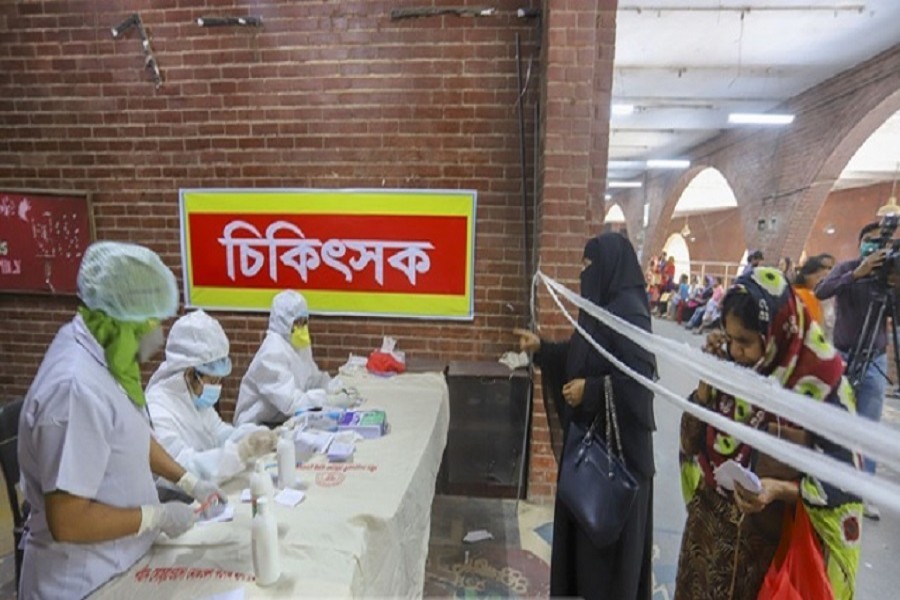The government's decision to suspend operations of the 'dedicated' COVID-19 hospitals on the ground of low- attendance of patients against a large number of beds has given rise to mixed reactions among doctors and relevant others.
The Directorate General of Health Services (DGHS) says the decision is not theirs, but it has come from 'above'.
Many tend to believe that middle and upper middle-class and upper-class people prefer not to take treatment in the government hospitals due to 'mismanagement and ill treatment of patients'.
Even some fixed income people are somehow managing expensive treatment in the private hospitals. It is now evident from the high attendance of COVID patients in the private hospitals.
Rights activists and doctors argue that the decision to close the dedicated COVID hospitals will only heighten the sufferings of general people, who are unable to pay high cost of the private hospitals, and will also create scopes of monopoly business.
There are 22 dedicated covid hospitals in Dhaka (both government and private) and nine in Chattogram division. There are over 15,000 general beds across the country, where more than 4,000 patients are admitted. The number of ICU beds is 533, where 284 patients are admitted.
DGHS additional director general Professor Dr Nasima Sultana told the FE that suspending operation of the dedicated covid hospitals is not the decision of the DG health alone. It is an agreed decision of all, as it involves huge cost, she added.
It is a matter of grave concern that Bangladesh is conducting very poor number of corona tests. It has become difficult to determine the actual situation in relation of COVID infection.
Official data shows the infection rate at around 20-21 per cent, which is high.
Experts say the number of cases could have been more, had there been more tests. The DGHS bulletin also shows the number of deaths is very low at home. It is also misleading, as the method of counting this number is unknown.
The authority also shows that the hospital beds are mostly empty, and people are receiving good treatment at home through telemedicine. Most health experts do not subscribe to such a view.
Seeking anonymity, an expert said it is a scientific method to operate some dedicated COVID hospitals at the primary stage of the outbreak. It should continue until the number of patients goes down substantially.
"If the pandemic lasts for a long period, these hospitals should be opened for both COVID and general patients by ensuring strong infection prevention control (IPC) system. The hospitals must implement triage system. Whatever system we implement, it should be done properly."
Besides, the private hospitals and clinics should also come forward to provide treatment following the same method during the pandemic. The government should control and rein in treatment cost in these hospitals, which is still not monitored here.
Besides, there should be short, mid and long-term planning regarding healthcare, he added.
However, supporting the decision to close down the dedicated covid hospitals, Bangladesh Medical Association (BMA) secretary general Dr Ehteshamul Huq Choudhury said all the private hospitals are now providing covid treatment. So, there is less pressure on the government hospitals.
"But I think the decision to close the dedicated COVID hospitals should not be implemented before August. I do not think there is any mismanagement in the government hospitals. It was the government, which came forward during the outbreak."
As there is less pressure on the government-run hospitals, the closure of dedicated covid hospitals will create opportunity to provide healthcare services to general patients and improve their services, he added.
Opposing the idea of Dr Ehtesham, Foundation for Doctors Safety Rights and Responsibility (FDSRR) joint secretary Dr Rahat Chowdhury said new COVID cases are on rise, and death rate has not decreased.
There could be renewed pressure of patients in the government hospitals after the Eid-ul-Azha, experts have expressed the fear.
"It is not an appropriate time to close the dedicated COVID hospitals, as the infection rate is still 20 per cent. People do not come for corona test due to lack of confidence and hassle."
"Besides, the isolation centres are like jail. The conflict between DGHS and the Ministry of Health has created an unhealthy situation in the COVID control activities."
He also said even if the data presented in everyday bulletin is correct, the decision to limit the access of general people to the government facilities cannot be supported.
The sufferings will be multiplied, as most of the people do not have the ability to take treatment in the private hospitals, he added.
Medicine expert Professor Robed Amin said there should be research on why people are not interested to receive treatment in the government hospitals and why they are not coming for test.
The authority should also find out why 15-20 per cent death is taking place at home, and why COVID patients are being asked to take treatment at home. These are happening, as the authorities concerned could not ensure patient-friendly hospitals.


